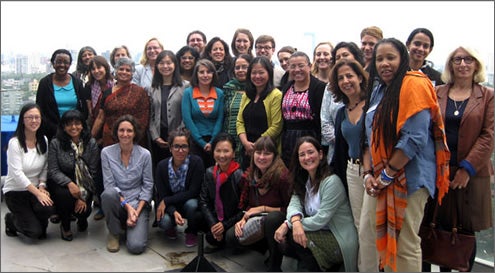Expert Group Meeting: Structural and policy constraints in achieving the MDGs for women and girls
In accordance with its multi-year programme of work (2010–2014), the 58th session of the Commission on the Status of Women (CSW) in 2014 considered the “Challenges and achievements in the implementation of the Millennium Development Goals for women and girls” as its priority theme.
As the 2015 target date for achieving the Millennium Development Goals (MDGs) approaches, intergovernmental and UN-led processes are well under way to inform and design a post-2015 development agenda and Sustainable Development Goals (SDGs). The 58th session of CSW in 2014 provided a critical opportunity for evaluating the current MDG framework from a gender perspective to better understand the achievements and challenges in implementing the MDGs for women and girls, accelerate progress in achieving the MDGs, and inform the ongoing debate on the post-2015 development framework and the 20-year review of the Beijing Declaration and Platform for Action.
To take stock on current research and assist the Commission in its deliberations, UN Women, in collaboration with the Economic Commission for Latin America and the Caribbean (ECLAC), convened an expert group meeting (EGM) on “Structural and policy constraints in achieving the MDGs for women and girls” from 21 to 24 October 2013 in Mexico City, Mexico. The aim of the EGM was to:
- Identify the challenges, including the structural and policy constraints, for achieving the MDGs for women and girls;
- Identify the policy priorities and critical issues for achieving the MDGs for women and girls and for the post-2015 agenda; and
- Develop action-oriented recommendations to accelerate achieving the MDGs for women and girls.
More information
Background papers
- Megan Dersnah, Canada
A review of national MDG reports from a gender perspective - Megan Dersnah, Canada
An analytical review of national post-2015 consultation reports from a gender perspective - Jayati Ghosh, India
Opportunities and challenges in achieving the MDGs: A gender-based analysis
Expert papers
- Radhika Balakrishnan, Center for Women’s Global Leadership, USA
Macro policy and the MDGs - Olivier De Schutter, United Nations Special Rapporteur on the right to food
Advancing women’s rights in post-2015 development agenda and goals on food and nutrition security - Valeria Esquivel, Universidad Nacional de General Sarmiento, Argentina
Measuring unpaid care work with public policies in mind - Naila Kabeer, London School of Economics and Political Science, United Kingdom
Rights, capabilities and collective action: Tthe “missing ingredient” in the MDGs - Renu Khanna, SAHAJ – Society for Health Alternatives, India
MDG 5 in India: Whither reproductive and sexual rights? - Marai Larasi, Imkaan and End Violence Against Women Coalition, United Kingdom
Beyond the silos and the silences: Addressing violence against women and girls within the post-2015 agenda - Isha Ray, University of California, Berkeley, USA
Challenges and achievements in Millennium Development Goals for water and sanitation for women and girls - Robinah Rubimbwa, Center for Women in Governance (CEWIGO), Uganda
Gender, peace and security and the post-2015 framework - Liane Schalatek, Heinrich Böll Stiftung North America, Germany
The post-2015 framework: Merging care and green economy approaches to finance gender-equitable sustainable development - Gita Sen and Avanti Mukherjee, India
No empowerment without rights, no rights without politics: Gender equality, MDGs and the post-2015 development agenda - Sivananthi Thanenthiran, ARROW, Malaysia
Have the MDGs fostered progress on women’s SRHR? Effective policies and remaining challenges - Cecilia Umul, International Indigenous Women Forum, Guatemala
Violence against women and girls - Elaine Unterhalter, Institute of Education, University of London, United Kingdom
The MDGs, girls’ education and gender equality - Hannah Wright, Saferworld, United Kingdom
Gender, peace and security and the post-2015 framework - Association for Women’s Rights in Development
Have the Millennium Development Goals promoted gender equality and women’s rights? - International Community of Women Living with HIV/AIDS
ICW statement on MDGs and post-2015
Observer papers
- Magdalena Sepúlveda Carmona, United Nations Special Rapporteur on extreme poverty and human rights
Unpaid care work, poverty and women’s human rights: challenges and opportunities for the post-2015 agenda
